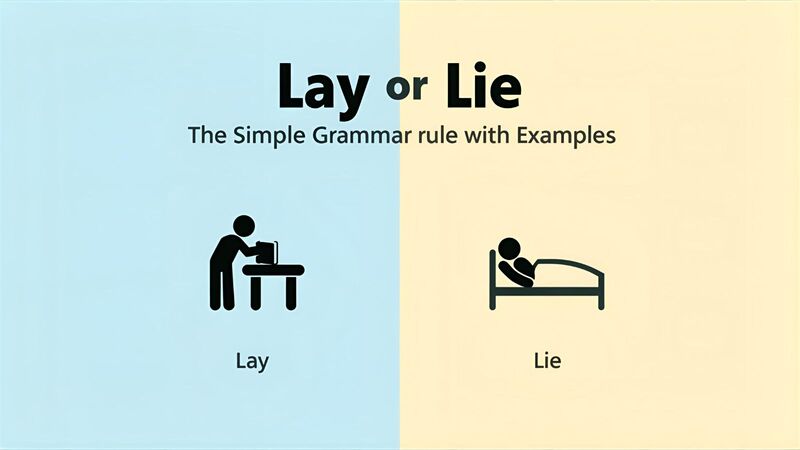Have you ever stopped mid-sentence, wondering whether to write “lay” or “lie”? If so, you are not alone.
The confusion around lay or lie is one of the most common grammar struggles, even for native English speakers.
This mix-up happens because the words look and sound simple but change forms depending on tense and meaning.
If you are searching for lay or lie, you’re likely trying to figure out the right choice for a sentence like: “I need to lay down” or “I need to lie down.”
The answer depends on grammar rules that often feel tricky at first glance.
This guide breaks everything down in plain language with examples, tables, and everyday use cases.
Whether you’re writing for school, work, or social media, this article will give you the confidence to use lay or lie correctly every time.
Lay or Lie – Quick Answer
- Lay means to put something down and always needs an object.
- Example: I lay the book on the table.
- Example: I lay the book on the table.
- Lie means to rest or recline and does not take an object.
- Example: I lie down on the bed.
- Example: I lie down on the bed.
Tense Forms:
- Lay → lay, laid, laid, laying
- Lie → lie, lay, lain, lying
The Origin of Lay or Lie
Both words come from Old English.
- Lay comes from lecgan, meaning to place or put down.
- Lie comes from licgan, meaning to rest or remain.
Over centuries, their forms grew confusing because the past tense of lie is lay, which looks identical to the present tense of lay. That’s why people often get mixed up.
British English vs American English Spelling
The rules for lay or lie are the same in British and American English. The difference lies in common usage and frequency.
| Word | British English Example | American English Example |
| Lay | She laid the keys on the desk. | She laid the phone on the table. |
| Lie | I lie down after lunch. | I lie down after work. |
Which Spelling Should You Use?
- US Audience → Stick to American usage, but rules stay the same.
- UK/Commonwealth → Same grammar rules apply, just slight preference differences in style.
- Global Audience → Focus on clarity. Use the forms correctly, and readers worldwide will understand.
Common Mistakes with Lay or Lie
- ❌ I need to lay down.
✅ Correct: I need to lie down. - ❌ She is laying on the couch.
✅ Correct: She is lying on the couch. - ❌ Yesterday, I lied on the bed.
✅ Correct: Yesterday, I lay on the bed.
Lay or Lie in Everyday Examples
- Emails: “Please lay the files on my desk before noon.”
- News Reports: “The minister will lie low until the investigation ends.”
- Social Media: “About to lie down and indulge-watch my favorite show.”
- Formal Writing: “He laid the foundation for modern architecture.”
Lay or Lie – Google Trends & Usage Data
Search data shows that “lay down” is searched more often than “lie down,” especially in the US. Many people default to lay because it sounds more natural in casual speech.
Top countries searching:
- United States – high confusion between lay/lie.
- UK & Canada – searches are steady but less frequent.
- India & Australia – growing interest due to English learning trends.
Comparison Table – Lay vs Lie
| Verb | Present | Past | Past Participle | Present Participle | Object Needed? |
| Lay | lay | laid | laid | laying | ✅ Yes |
| Lie | lie | lay | lain | lying | ❌ No |
FAQs :
1. Is it “lay in bed” or “lie in bed”?
Correct: Lie in bed. (No object)
2. Did I “lay down” or “lie down” yesterday?
Correct: I lay down yesterday. (Past tense of lie)
3. Can “lay” ever mean rest?
No. Lay always needs an object.
4. Why is the past tense of “lie” the same as present “lay”?
Because they come from different Old English roots that evolved similarly.
5. How do I remember the difference easily?
If you can replace it with place/put, use lay. If it means recline/rest, use lie.
6. Is “lying” correct for present tense?
Yes: I am lying on the sofa.
7. What about the word “lied”?
That comes from the verb to lie (meaning not tell the truth), not to recline.
Conclusion
The confusion between lay or lie is natural because the words overlap in forms and sound alike. But with a little practice, you can master their usage.
- Use lay when you put something down.
- Use lie when you recline or rest.
- Remember: lay = needs an object, lie = no object.
By keeping these rules in mind and checking the tables provided, you’ll avoid common mistakes and write with clarity and confidence. Next time you pause before typing “lay” or “lie,” you’ll know exactly which word to choose.

I’m Emma Collins, a grammar expert and author at Grammarnestly.com. I love helping readers master English with simple, practical grammar guides.
When I’m not writing, I enjoy reading, coffee, and exploring the beauty of language.



